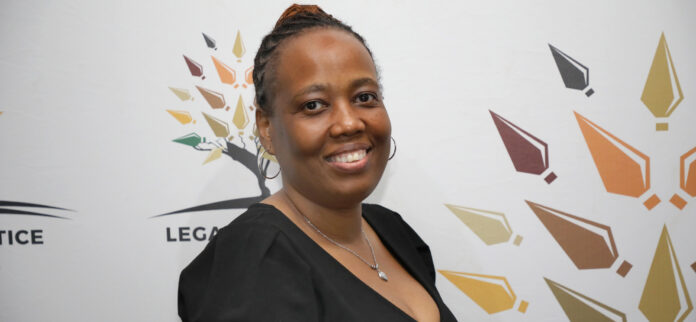The Legal Services Ombud has cleared the Legal Practice Council (LPC) and its chief executive officer (CEO), Charity Nzuza, of any wrongdoing after she was accused of maladministration and financial mismanagement.
The Legal Services Ombud said there was no evidence to support the allegations of maladministration levelled against the LPC and Nzuza.
This was after the Legal Services Ombud established an inquiry following allegations levelled against Nzuza. The allegations included, among others, financial mismanagement, poor treatment of senior managers, and unlawful instructions to alter candidates’ examination marks, as well as poor governance and a lack of transparency.
The Ombud said the allegations were unsubstantiated and without merit.
These findings were made in the investigation report of the Legal Services Ombud dated August 15 2025.
The Legal Services Ombud launched an independent inquiry to investigate the allegations of maladministration against Nzuza.
High-powered team
The Legal Services Ombud team investigating the allegations against Nzuza consisted of Judge Siraj Desai, William Mailula (attorney), and Tshianeo Mamphaga (attorney). All three are officials from the office of the Legal Services Ombud.
Desai is the Ombud for Legal Services, Mamphaga is the manager responsible for complaints and investigations in the office of the Legal Service Ombud, and Mailula is the acting director in the office of the Legal Service Ombud.
According to the investigation report, in October 2024, a whistleblower lodged a complaint with the Legal Services Ombud and the LPC.
“He levelled serious allegations of maladministration at the LPC, particularly by its Executive Officer, Ms Charity Nzuza,” said the report.
The report stated that the whistleblower is the LPC’s former senior manager responsible for risk and compliance. His allegations were levelled against the LPC, Nzuza and the Director of the Northern Cape Provincial Office, Alida Janse Van Rensburg.
The allegations levelled against Nzuza are of maladministration, including, among other things, financial mismanagement; ill-treatment of senior managers, resulting in their resignation from the LPC; instructions to the Senior Manager of Education and Training to alter examination marks of candidates; failure to act on allegations of misconduct by employees; and abuse of authority.
The LPC resolved that an independent entity should investigate the whistleblower’s allegations. It thus approached the Legal Services Ombud, as the oversight body
for the legal profession, to investigate the allegations.
The issues for investigation in the inquiry by the Legal Services Ombud thus included maladministration, financial mismanagement, irregular conduct by senior executives, and failures in governance processes within the LPC.
Evidence does not stand to scrutiny
In its findings, the Legal Services Ombud found that the evidence presented does not support the allegations of financial mismanagement as levelled by the whistleblower against Nzuza.
“The whistleblower sought to highlight areas that he considered more prudent to
prioritise the LPC’s funds. The allegation is without merit, as it concerns operational matters of budgets and managerial discretion. The LPC’s Risk and Compliance department could have benefited from additional capacity. However, the evidence does not justify attributing any deficit in capacity to misconduct by Ms Nzuza,” said the report.
“The gaps that the whistleblower experienced in the capacity of his department stemmed from structural and budgetary limitations, which are being remedied by the LPC progressively. Ms Nzuza had to weigh the capacity constraints of the organisation as a whole versus the needs of one department.
“Furthermore, the Executive Officer showed that they did address the capacity needs of the Risk and Compliance department by employing one staff member and approving the recruitment process for a risk officer. However, the whistleblower was unsatisfied with these capacitation efforts. The Ombud finds the steps taken by the Executive Office as reasonable,” said the report.
Desai said the evidence presented does not support the allegation that Nzuza failed to act in response to the whistleblower’s investigation against Janse Van Rensburg.
“Where she found merit in the investigation outcomes, she addressed the concerns by issuing warnings and adverse performance scores against Ms Janse Van Rensburg. In other cases, she commissioned further independent investigations and acted on their outcomes to the extent that further action was warranted,” said Desai.
“The allegation that a suspended legal practitioner wrongfully received payments from the Legal Practice Council should be addressed with the appointed curator and the risk and compliance committee.
Remedy applied was correct
“On the one hand, the LPC made a reasonably justifiable decision to appoint an agent law firm to pay the business expenses of the suspended legal practitioner during the curatorship process. On the other hand, the firm that was appointed was a chosen agent of the suspended legal practitioner, and no proper safeguards were put in place before advancing funds to it. As a result, the law firm did not use the funds as agreed, and it has defaulted on all the LPC’s calls for it to account for the funds,” added Desai.
The report recommended that the LPC should strengthen internal governance and disciplinary frameworks, improve internal communication and leadership culture, develop a job profile to clarify the scope of the executive officer’s powers and functions, and develop a travel policy, among others.



